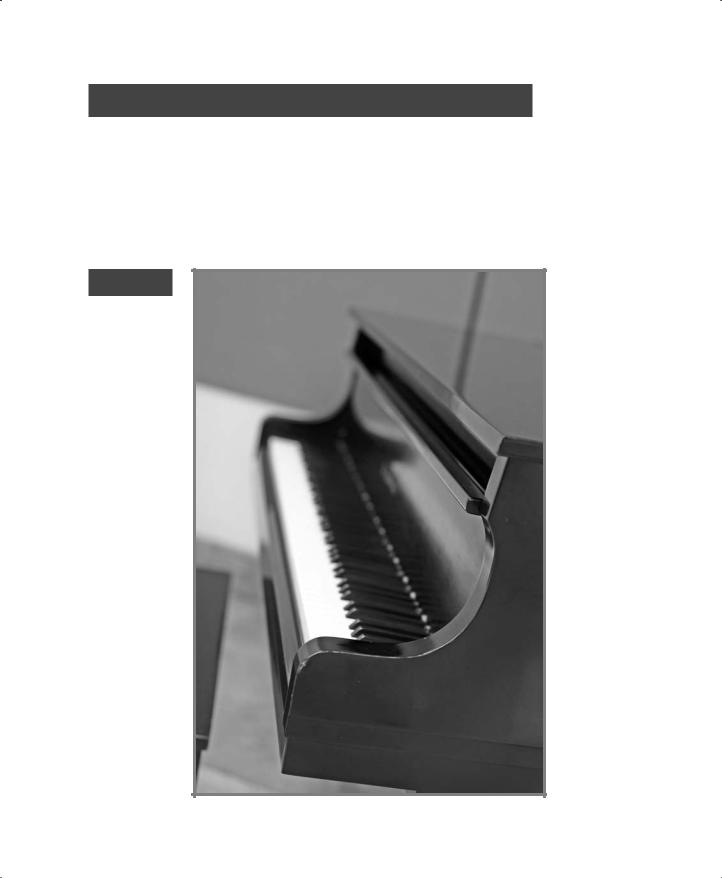
- •Contents
- •Preface
- •Acknowledgments
- •Founders of the Hotel Industry
- •E. M. Statler
- •Conrad Hilton
- •Cesar Ritz
- •William Waldorf Astor and John Jacob Astor IV
- •Kemmons Wilson
- •Ernest Henderson and Robert Moore
- •Ray Schultz
- •Historical Developments
- •Atrium Concept
- •Select-Service Hotels
- •Technological Advances
- •Marketing Emphasis
- •Total Quality Management
- •Major Reorganization, 1987–1988
- •Hotel Investment
- •September 11, 2001
- •Economic Downturn of the Late 2000s
- •Overview of the Hotel Industry
- •Types of Lodging Facilities
- •Hotels
- •Motels
- •All-suites
- •Select-service Hotels
- •Extended-stay Hotels
- •Market Orientation
- •Sales Indicators
- •Occupancy
- •Average Daily Rate (Average Room Rate)
- •Yield Percentage
- •RevPAR (Revenue per Available Room)
- •Levels of Service
- •Business Affiliations
- •Chain Affiliation
- •Referral Property
- •Company-owned Property
- •Management Contract Property
- •Brands
- •Independent Properties
- •Trends That Foster Growth
- •Leisure Time
- •The Me/Pleasure Concept
- •Discretionary Income
- •Family Size/Household Size
- •Business Travel
- •Female Business Travel
- •Travel as Experience
- •Career Development
- •Educational Preparation
- •Work Experience
- •Professional Memberships
- •Ports of Entry
- •Researching Growth Areas in the Hospitality Industry
- •Solution to Opening Dilemma
- •Chapter Recap
- •End-of-Chapter Questions
- •Notes
- •Key Words
- •Organization of Lodging Properties
- •Organization Charts
- •Typical Job Responsibilities of Department Managers
- •General Manager
- •Assistant General Manager
- •Food and Beverage Director
- •Physical Plant Engineer
- •Executive Housekeeper
- •Human Resources Manager
- •Marketing and Sales Director
- •Front Office Manager
- •Controller
- •Director of Security
- •Parking Garage Manager
- •Organization of the Front Office Department
- •Typical Front Office Organization
- •Select-service Hotel Front Office Organization
- •Function of the Front Office Manager
- •Job Analysis and Job Description
- •The Art of Supervising
- •Staffing the Front Office
- •Solution to Opening Dilemma
- •Chapter Recap
- •End-of-Chapter Questions
- •Key Words
- •Role of the Front Office in Interdepartmental Communications
- •Front Office Interaction with Other Departments in the Hotel
- •Marketing and Sales Department
- •Housekeeping Department
- •Food and Beverage Department
- •Banquet Department
- •Controller
- •Maintenance or Engineering Department
- •Security Department
- •Human Resources Management Department
- •Analyzing the Lines of Communications
- •Situation 1: Marketing and Sales Knows It All—But Didn’t Tell Us
- •Situation 2: Peace and Harmony in 507
- •Situation 3: I Know What You Said, and I Think I Know What You Mean
- •The Role of Total Quality Management in Effective Communication
- •An Example of Total Quality Management in a Hotel
- •Solution to Opening Dilemma
- •Chapter Recap
- •End-of-Chapter Questions
- •Key Words
- •Physical Structure and Positioning of the Front Desk
- •Guest First Impression
- •Creating a Balance Between Guest Flow and Employee Work
- •Selecting a Property Management System
- •Importance of a Needs Analysis
- •Procedure for Performing a Needs Analysis
- •Selecting a Team
- •Analyzing the Flow of Guests through the Hotel
- •Communicating Information
- •Reviewing Administrative Paperwork
- •Management Review of Information
- •Evaluate Needs That Have Been Identified
- •Assessing Needs Based on Findings
- •Choosing Software
- •Choosing Hardware
- •Other PMS Selection Considerations
- •Vendor Claims
- •Hardware Installation Plans
- •Computer Training Programs
- •Backup Power Sources
- •Maintenance Agreement
- •Financial Considerations
- •PMS Applications
- •Reservations
- •Revenue Management
- •Registration
- •Room Status
- •Posting
- •Call Accounting
- •Checkout
- •Night Audit
- •Inquiries/Reports
- •Back Office
- •Housekeeping
- •Food and Beverage
- •Maintenance
- •Security
- •Marketing and Sales
- •Personnel
- •Electronic Mail
- •Time Clock
- •Solution to Opening Dilemma
- •Chapter Recap
- •End-of-Chapter Questions
- •Notes
- •Key Words
- •Importance of a Reservation System
- •Overview of the Reservation System
- •Choice Hotels International
- •Hilton Hotels
- •Marriott International
- •Global Distribution Systems (GDS) in Securing Reservations
- •Role of the Internet in Securing Reservations
- •Background on Room Rates Offered via the Internet
- •Effect of Internet on Pricing Rooms
- •Consumers Response to Use of the Internet—Third-Party Websites
- •Social Media
- •Financial Effects of Third-Party Reservations
- •Types of Reservation Systems
- •Franchisee
- •Referral Member
- •Sources of Reservations
- •Corporate Clients
- •Social/Military/Educational/Religious/Fraternal (SMERF)
- •Meetings/Incentive/Conference/Event (MICE)
- •Group Travelers
- •Leisure Travelers
- •Current Guests
- •Forecasting Reservations
- •Overbooking (Occupancy Management)
- •Revenue Management
- •Processing Guest Reservations
- •Systemwide Reservation Systems
- •Outsourcing Reservations
- •Types of Reservations
- •Reservation Codes
- •Cancellation Codes
- •Blocking Procedure
- •Process of Completing Reservations through a PMS
- •Database Interfaces
- •True Integration
- •Solution to Opening Dilemma
- •Chapter Recap
- •End-of-Chapter Questions
- •Notes
- •Key Words
- •Occupancy Percentage
- •Average Daily Rate
- •RevPAR
- •History of Yield Management
- •Use of Yield Management
- •Revenue Manager
- •Components of Revenue Management
- •Definition of Yield
- •Optimal Occupancy and Optimal Rate
- •Strategies
- •Forecasting
- •Star Report
- •Block-out Periods
- •Systems and Procedures
- •Channel Management
- •Feedback
- •Management Challenges in Using Revenue Management
- •Considerations for Food and Beverage Sales
- •Applications of Revenue Management
- •Scenario 1
- •Scenario 2
- •Scenario 3
- •Solution to Opening Dilemma
- •Chapter Recap
- •End-of-Chapter Questions
- •Notes
- •Key Words
- •Importance of the First Guest Contact
- •Components of the Registration Process
- •Capturing Guest Data
- •Guest Registration Procedure
- •Guest Hospitality
- •Inquiry about Reservation
- •Completion of Registration Card
- •Review Completeness of Registration Card
- •Extension of Guest Credit
- •Room Selection
- •Room Assignment from Inventory
- •Assigning Room Rates
- •Discuss Sales Opportunities
- •Assigning Room Keys
- •Security of the Key System
- •Maintaining the Key System
- •Registration with a PMS
- •Retrieving Reservation Form
- •Checking Room Inventory Option
- •Checking Room Status Option
- •Verifying Room Rate
- •Issuing Room Key
- •Obtaining Reports from the PMS
- •Self-Check-In
- •Solution to Opening Dilemma
- •Chapter Recap
- •End-of-Chapter Questions
- •Notes
- •Key Words
- •Common Bookkeeping Practices
- •Debits and Credits
- •Forms Used to Process Guest Charges and Payments
- •Folio, Transfers, and Paid-out Slips
- •Account Ledgers
- •Guest Ledger and City Ledger
- •Posting Guest Charges and Payments
- •Point-of-sale
- •Room and Tax
- •Transfers and Adjustments
- •Paid-Out
- •Miscellaneous Charges
- •Phone
- •Display Folio
- •Reports
- •Transferring Guest and City Ledgers to Accounts Receivable
- •Solution to Opening Dilemma
- •Chapter Recap
- •End-of-Chapter Questions
- •Key Words
- •Organizing Late Charges to Ensure Accuracy
- •Guest Checkout Procedure
- •Inquiring about Quality of Products and Services
- •Retrieving the Room Key
- •Retrieving and Reviewing the Folio
- •In-room Guest Checkout
- •Determining Method of Payment and Collection
- •Credit Cards
- •Bill-to-account (Direct Billing)
- •Cash and Personal Checks
- •Traveler’s Checks
- •Debit Cards
- •Assisting the Guest with Method of Payment
- •Money Wire
- •Travelers Aid Society
- •Auto Clubs
- •International Currency Exchange
- •Obtaining Future Reservations
- •Filing Documents
- •Relaying Guest Departures to Other Departments
- •Removing Guest Information from the System
- •Transfer of Guest Accounts to the Back Office
- •Checkout Reports Available with a Property Management System
- •Guest Histories
- •ZIP Code or Postal Code
- •Developing Conventions and Conferences
- •FAM Tours
- •Origination of Reservation
- •Frequency of Guest Visit
- •Types of Room Requested
- •Room Rates versus Occupancy Patterns
- •Tracking Social Media
- •Last Impressions of the Hotel
- •Solution to Opening Dilemma
- •Chapter Recap
- •End-of-Chapter Questions
- •Notes
- •Key Words
- •Importance of the Night Audit
- •The Night Auditor
- •The Night Audit Process
- •Posting Room and Tax Charges
- •Assembling Guest Charges and Payments
- •Reconciling Departmental Financial Activities
- •Reconciling Accounts Receivable
- •Running the Trial Balance
- •Goal of Preparing the Night Audit Report
- •Preparing the Night Audit Report
- •Departmental Totals
- •Bank Deposit
- •Accounts Receivable
- •Cashier’s Report
- •Manager’s Report
- •Formulas for Balancing the Night Audit Report
- •Room and Tax
- •Total Restaurant Sales and Sales Tax
- •Tips for Restaurant, Room Service, Banquet, and Lounge Employees
- •Room Service
- •Banquet Sales
- •Banquet Bar and Total Lounge Sales
- •Room Rental
- •Valet
- •Telephone Charges
- •Gift Shop Sales and Tax
- •Vending
- •Parking
- •Total Revenue and Total Write-Offs
- •Cash Sales and Accounts Receivable Balance
- •Credit Cards and Cash Applied to Accounts Receivable
- •Analysis of Accounts Receivable
- •Bank Deposit and Amount Transferred to Accounts Receivable
- •Cashier’s Report
- •Operating Statistics
- •Daily Flash Report
- •Reading the Flash Report
- •Reading the Night Audit
- •Solution to Opening Dilemma
- •Chapter Recap
- •End-of-Chapter Questions
- •Key Words
- •Importance of Hospitality
- •Managing the Delivery of Hospitality
- •Management’s Role
- •The Service Strategy Statement
- •Financial Commitment
- •Total Quality Management Applications
- •Developing a Service Management Program
- •Guest Cycle
- •Moments of Truth in Hotel Service Management
- •Employee Buy-in Concept
- •Screening Employees Who Deliver Hospitality
- •Empowerment
- •Training for Hospitality Management
- •Evaluating the Service Management Program
- •Follow-through
- •Interfacing with Other Departments in Delivering Hospitality
- •Customer Relationship Management
- •Solution to Opening Dilemma
- •Chapter Recap
- •End-of-Chapter Questions
- •Notes
- •Key Words
- •Determining Employee Hospitality Qualities
- •Job Analysis and Job Descriptions
- •Positive Hospitality Character Traits
- •Practicing Promotional Skills
- •Screening for Hospitality Qualities
- •An Outgoing Personality
- •Patience
- •Ability to Accept Constructive Criticism
- •Interest in Selling
- •Developing an Orientation Program
- •Economic Position of the Property in the Community
- •Overview of the Lodging Establishment
- •Employee Handbook
- •Policy and Procedure Manual
- •Introduction to the Front Office Staff
- •Equipment Overview
- •Interdepartmental Cooperation
- •Administering the Orientation Program
- •Selection of Orientation Leader
- •Developing a Training Program
- •Identification of Tasks and Job Management Skills
- •Preparing Step-by-Step Procedures
- •Management Concepts
- •Steps in the Training Process
- •Preparation: Get Ready
- •Delivery: Show Me
- •Administering a Training Program
- •Cross-training
- •Developing a Trainer
- •Job Knowledge
- •Training for Empowerment
- •Americans with Disabilities Act
- •Solution to Opening Dilemma
- •Chapter Recap
- •End-of-Chapter Questions
- •Notes
- •Key Words
- •The Role of the Front Office in Marketing and Sales
- •Planning a Point-of-sale Front Office
- •Set Objectives
- •Brainstorm Areas for Promotion
- •Evaluate Alternatives
- •Devise Incentive Programs
- •Theories of Motivation
- •Douglas McGregor
- •Abraham Maslow
- •Elton Mayo
- •Frederick Herzberg
- •Applying Motivation Theories
- •Maslow
- •Mayo
- •Herzberg
- •Training Programs for a Point-of-sale Front Office
- •Train in Sales Skills
- •Develop an Attitude of Presenting Opportunities
- •Let Employees Experience Hotel Services
- •Use Role-Playing to Create Your Own Training Video
- •Budgeting for a Point-of-sale Front Office
- •Feedback
- •Guest Test
- •Financial Results
- •Planning a Point-of-sale Front Office—An Example
- •Solution to Opening Dilemma
- •Chapter Recap
- •End-of-Chapter Questions
- •Notes
- •Key Words
- •Importance of a Security Department
- •Organization of a Security Department
- •Job Analysis of the Director of Security
- •In-House Security Departments versus Contracted Security
- •Room Key Security
- •Hard-key System
- •Electronic Locks System
- •Smart Card
- •Contactless Electronic Locks
- •Fire Safety
- •General Fire Code Requirements
- •Guest Expectations
- •Fire Safety Plan
- •Employee Training in Fire Safety
- •Guest Instruction in Fire Safety
- •Fire Action Communication Procedure
- •Emergency Communication
- •Developing the Emergency Communication Plan
- •Employee Safety Programs
- •Employee Safety Committee
- •Composition and Activities of the Safety Committee
- •Department Supervisors’ Responsibility
- •Safety Training Programs
- •Solution to Opening Dilemma
- •Chapter Recap
- •End-of-Chapter Questions
- •Notes
- •Key Words
- •Importance of the Housekeeping Department
- •Overview of a Housekeeping Department
- •Relationship of the Executive Housekeeper to the General Manager
- •Management of a Housekeeping Department
- •Room Assignment/Workload
- •Outsourcing Housekeeping Activities
- •Housekeeper’s Report
- •Communication
- •Situation 1: Why Can’t Room Attendants Get Those Rooms Cleaned More Quickly, or, If That Guest Asks One More Time…
- •Inventory Control
- •Fixtures
- •Theft Control of Inventory
- •In-house Laundry versus Outsourced Laundry
- •Occupational Safety and Health Administration
- •Material Safety Data Sheets
- •Americans with Disability Compliance
- •Professional Associations
- •Role of Chief Engineer in a Lodging Property
- •Job Analysis
- •Job Description
- •Technology
- •Managing Maintenance Inter-departmental Communications
- •Energy Management
- •The Greening of the Lodging Industry
- •Leadership in Energy and Environmental Design (LEED)
- •Solution to Opening Dilemma
- •Chapter Recap
- •End-of-Chapter Questions
- •Notes
- •Key Words
- •Glossary
- •Index

K E Y W O R D S 371
4.Marriott Foundation, “‘Fear of the Unknown’ Invisible Barrier to Employment, Says Marriott Foundation for People with Disabilities,” Washington, DC, September 30, 1997; edited July 23, 2001. Copyright Marriott Foundation for People with Disabilities.
5.Ibid.
Key Words
Americans with Disabilities Act (ADA) |
orientation process |
cash bank |
policy and procedure manual |
cross-training |
role-playing |
documentation |
skill demonstration |
employee handbook |
telephone initiation and reception |
on-the-job training |
agreements |
|
|
orientation checklist |
training tickler file |
|

C H A P T E R 1 3
Promoting In-House Sales
O P E N I N G D I L E M M A
The food and beverage manager has spent several thousand dollars on a
marketing study to determine the dining needs of in-house guests. The
chef has rewritten each menu to reflect those needs. However, the bell staff and front desk clerks continue to recommend the MidTown Deli around the corner as “a nice place to get something good to eat any time of day.”
As the hospitality industry grows more sophisticated, with greater concern for delivering high-quality services, maximizing sales in all profit centers of the hotel is important. Additional sales to current guests—in the form of future reservations, in-house dining, room service, lounge and entertainment patronage, gift shop purchases, and the like—assists in producing a favorable profit-and-loss statement. The front office plays a key role in promoting these sales, and the front office manager must develop and implement a plan to optimize the sales opportunities available to the front office staff. This plan includes focusing on areas for promotion; developing objectives and procedures, incentive programs, training programs for personnel, budgets, and tracking systems for employee feedback; and profitability.
C H A P T E R F O C U S P O I N T S
■Role of the front office in a hotel’s marketing program
■Planning a point-of-sale front office

T H E R O L E O F T H E F R O N T O F F I C E I N M A R K E T I N G A N D S A L E S 373
The Role of the Front Office in Marketing and Sales
The front office is often seen as an information source and a request center for guests and hotel employees alike. Front office staff may need to field questions such as “Has the front office manager produced the room sales forecast yet?” “Is a block of rooms available for June 3 to 7?” “To which rooms is this seminar group assigned?” “Is someone on duty who can greet and provide information for the tourist group arriving this afternoon?”“Has the daily event board been set up in the lobby?” and “Has the daily message
F I G U R E 1 3 - 1
Displays such as this one alert guests to in-house
entertainment. Photo courtesy of iStockphoto.com.

374 C H A P T E R 1 3 ■ P R O M O T I N G I N - H O U S E S A L E S
been set on the great sign?” These are typical questions asked of the front office by other departments in the hotel. Answering them is a necessary part of any hotel’s operations. Today, more than ever, hotel management demands a great deal of the front office.
In an article published in Canadian Hotel and Restaurant, Avinash Narula reports:
As market conditions have changed, the nature and importance of the functions performed by the front office have also changed from being an order-taking department to an order-generating or sales department. If one looks at the balance sheet of any hotel, it will become obvious that the major portion of the profits, on average 60 percent, come from room sales.1
Doug Kennedy emphasizes how the potential walk-in guest provides an excellent opportunity for a sale.
[T]he walk-in sales opportunity provides the hotel with some significant advantages over other distribution channels. For one, the sales person can visually evaluate the guests’ needs and wants. Are they dressed as if on a business trip, or on vacation? What is their age? Are they traveling alone or with family? What is their level of commitment; do they park the car and walk in with luggage, or do they just run in to find out the price?
A second advantage is that the sales prospect can see the product firsthand and is able to formulate a first impression. (This is why it is critical for hotels to maintain curb appeal.) Another significant advantage in selling to walk-ins is that it takes more effort for the prospect to shop around. It’s harder to get back in the car and drive down the road than it is to click on the next Internet link or to dial the phone number of the next property.
Kennedy continues with suggestions for securing a sale, such as connecting with the customer, offering options, describing room and rate options, and avoiding positioning last-sell or higher-rated options in the negative.2
This change in the nature of the front office’s role, from a passive order taker to an active order generator, challenges the front office manager to review the front office staff’s established routine. The front office manager must figure out the best way to direct the energies of the staff to support the efforts of the marketing and sales department.
The front office manager must first consider the attitude of the front office staff. These employees have been trained and rewarded for accurate performance of clerical tasks, playing a passive role in the sales of services. How easy will it be to transform them into active salespeople, persuading guests to purchase additional reservations, services in the dining room and lounge, or products in the gift shop? At the outset, most front office managers would say this is a tall order. Established, routine habits are comfortable and unstressful. However, the front office manager is a member of the management team and must interact with other managers as well as the employees as a plan is developed.
